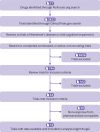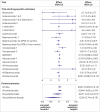Effect of reductions in amyloid levels on cognitive change in randomized trials: instrumental variable meta-analysis
- PMID: 33632704
- PMCID: PMC7905687
- DOI: 10.1136/bmj.n156
Effect of reductions in amyloid levels on cognitive change in randomized trials: instrumental variable meta-analysis
Erratum in
-
Effect of reductions in amyloid levels on cognitive change in randomized trials: instrumental variable meta-analysis.BMJ. 2022 Aug 30;378:o2094. doi: 10.1136/bmj.o2094. BMJ. 2022. PMID: 36041754 Free PMC article. No abstract available.
Abstract
Objective: To evaluate trials of drugs that target amyloid to determine whether reductions in amyloid levels are likely to improve cognition.
Design: Instrumental variable meta-analysis.
Setting: 14 randomized controlled trials of drugs for the prevention or treatment of Alzheimer's disease that targeted an amyloid mechanism, identified from ClinicalTrials.gov.
Population: Adults enrolled in randomized controlled trials of amyloid targeting drugs. Inclusion criteria for trials vary, but typically include adults aged 50 years or older with a diagnosis of mild cognitive impairment or Alzheimer's disease, and amyloid positivity at baseline.
Main outcome measures: Analyses included trials for which information could be obtained on both change in brain amyloid levels measured with amyloid positron emission tomography and change in at least one cognitive test score reported for each randomization arm.
Results: Pooled results from the 14 randomized controlled trials were more precise than estimates from any single trial. The pooled estimate for the effect of reducing amyloid levels by 0.1 standardized uptake value ratio units was an improvement in the mini-mental state examination score of 0.03 (95% confidence interval -0.06 to 0.1) points. This study provides a web application that allows for the re-estimation of the results when new data become available and illustrates the magnitude of the new evidence that would be necessary to achieve a pooled estimate supporting the benefit of reducing amyloid levels.
Conclusions: Pooled evidence from available trials reporting both reduction in amyloid levels and change in cognition suggests that amyloid reduction strategies do not substantially improve cognition.
© Author(s) (or their employer(s)) 2019. Re-use permitted under CC BY-NC. No commercial re-use. See rights and permissions. Published by BMJ.
Conflict of interest statement
Competing interests: All authors have completed the ICMJE uniform disclosure form at www.icmje.org/coi_disclosure.pdf and declare: support from the National Institutes of Health National Institute on Aging for the submitted work; no financial relationships with any organizations that might have an interest in the submitted work in the previous three years; no other relationships or activities that could appear to have influenced the submitted work.
Figures


Comment in
-
Instrumental variable meta-analysis of aggregated randomized drug trial data for evaluating proposed target mechanisms.BMJ. 2021 Feb 25;372:n346. doi: 10.1136/bmj.n346. BMJ. 2021. PMID: 33632740 No abstract available.
-
Anti-amyloid trials raise scientific and ethical questions.BMJ. 2021 Mar 26;372:n805. doi: 10.1136/bmj.n805. BMJ. 2021. PMID: 33771816 No abstract available.
References
-
- Hardy J. Alzheimer’s disease: the amyloid cascade hypothesis: an update and reappraisal. J Alzheimers Dis 2006;9(Suppl):151-3. - PubMed
Publication types
MeSH terms
Substances
Grants and funding
LinkOut - more resources
Full Text Sources
Other Literature Sources
Medical
